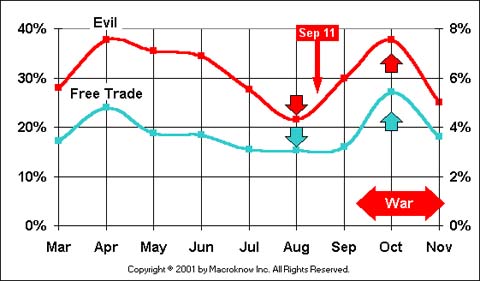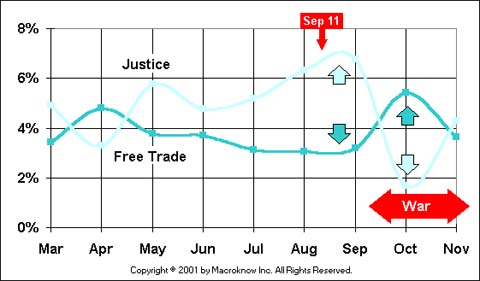|
EDITORIAL
Nothing But A Tail
© 2001 Macroknow Inc. All Rights Reserved.
The rhetoric of the champions of "free trade" is
received doctrine around the globe -- at least, this is what many global
lenders want borrowers to believe.
Government and business leaders continuously trumpet
the benefits of a global marketplace -- one free private exchange economy
spanning the globe. The "free" marketplace expands freedom and
democracy, we are told. But do people believe the canting?
The Macroknow Global Topics measure people's
interests in, or concern about, a variety of topics -- including,
especially, Free
Trade. What do the Macroknow indices tell us?
They
tell us, unequivocally, that there is, in people's minds, a positive correlation between
Free
Trade and
Evil.
And that increases in
Free
Trade are not necessarily compatible with
Justice.
Look at the
empirical Charts below. They corroborate stunning correlations: A positive correlation between Free
Trade and Evil; and a negative correlation between Free
Trade and Justice.
This is a matter of great concern.
 |
CHART 1
Macroknow Global Topics Indices for Free Trade (right axis) and
Evil (left axis). Note that
Evil and Free Trade are positively correlated.
|
 |
CHART 2
Macroknow Global Topics Indices for Free Trade and Justice. Note
that Justice and Free Trade are negatively correlated.
|
G8, WTO, World
Bank, and business leaders have been aggressively pushing for the globalization
of "free trade." But, notwithstanding the repetitive
mantra, many people do not
trust the doctrine of "free trade."
Why? "Free
trade," as currently constituted, is financed, in large part, by public and private
debts -- and debt is nothing but economic slavery.
This slavery has been codified in the
Tanach as follows: "The
rich rule the poor, and the borrower is a slave of the lender"
(Proverbs 22:7).1
The magnitude of the servitude in the United
States can be measured by the monstrosity of America's private and public
debts. America's public debt
on November 30, 2001, was nearly $5.9 trillion.2 The debt of the U.S. domestic nonfinancial
sectors in September 2001 was in excess of $19 trillion!3
There
is plenty of advice on lending and borrowing.
Here
is the advice the Hebrew sages and prophets gave to the Jews:
"At the end of every
seven years thou shalt make a release. And this is the
manner of the release: Every creditor that lendeth ought
unto his neighbour shall release it . . . Of a
foreigner thou mayest exact it again . . . "
[Deuteronomy 15:1-3]
"Thou shalt not lend upon
usury to thy brother; usury of money, usury of victuals, usury of
anything that is lent upon usury;
Unto a stranger thou mayest lend upon usury . . . "
[Deuteronomy 23:19-20] "The
LORD shall open unto thee his good treasure . . .and thou
shalt lend unto many nations, and thou shalt not borrow.
And the LORD shall make thee the head, and not the tail . . . " [Deuteronomy 28:12-13] |
The advice to the Jews is particularly relevant today.
It clearly prohibits borrowing -- but it encourages lending to others. Most important, it differentiates between the lender and the
borrower: the lender is the
"head"; the
borrower is the "tail" -- or, in the words of the Tanach, "a slave
of the lender."
Let
the heads of nations beware! They are being cajoled to join the "free
trade" club. But this is a monstrous deception. The deception is designed to
transform free peoples into nothing but a tail.
The great
philosopher Immanuel Kant saw clearly through the
lender's
veil of deceit. In Perpetual Peace he wrote:
"
. . . [A]s an instrument in the struggle among powers, the credit system
-- the ingenious invention of a
commercial people [England] during this century -- of endlessly
growing debts that remain safe against immediate demand (since the
demand for payment is not made by all creditors at the same time) is
a dangerous financial power. It is a war
chest exceeding the treasure of all other nations taken
together . . . This ease in making war, combined with the
inclination of those in power to do so . . . is a great obstacle to
perpetual peace. Thus, forbidding
foreign debt must be a preliminary article for perpetual peace . . . "4
[my emphasis]
|
Given the monstrosity of global
debts, you can forget about perpetual peace. My advice is simple: If you
want perpetual peace, rid the
world of debt -- otherwise, prepare for war.5
Dr.
Edward E. Ayoub
1 The King James version of the
Old
Testament replaces slave with servant: "The rich ruleth over the poor, and
the borrower is servant to the lender."
2 The Debt to the Penny,
Bureau
of the Public Debt Online, Washington, http://www.publicdebt.treas.gov/opd/opdpenny.htm.
3 The Federal Reserve Board, Money Stock and Debt
Measures, H.6 Historical Data, Table 1 M1, M2, M3 and Debt (SA
and NSA), December 6, 2001, http://www.federalreserve.gov/releases/H6/hist/h6hist1.txt.
4 Immanuel Kant. To Perpetual Peace: A
Philosophical Sketch (1795). Essay included in Immanuel
Kant, Perpetual Peace and Other Essays on Politics, History, and
Moral Practice. Translated with an Introduction by Ted Humphrey.
Indianapolis, IN: Hackett Publishing Company, Inc., 1983, at
107-143.
5
See Edward
E. Ayoub, World
War III Against the Money Trust?. Toronto, ON: Macroknow Inc., 1998.
Copyright © 2001-2009 by Macroknow Inc. All Rights Reserved.
Posted December 8, 2001.
Updated January 10, 2002.
|